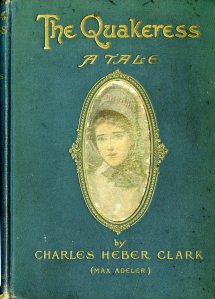
Though the name is virtually unknown today, Charles Heber Clark, who sometimes wrote under the name “Max Adeler,” was a best-selling author of humorous stories
In 1856 or 1857 (according to his son, Frederick L. Clark), teenager Charles H. Clark moved from Maryland to Philadelphia to begin his working life. He began as a reporter for several Philadelphia newspapers, eventually becoming an editor and even owning his own paper, the Textile Record. His career was briefly interrupted by two years in military service during the Civil War. After the war he gained fame with the publication of his first book.
Out of the Hurley-Burley, or, Life in an Odd Corner was published in 1874 under the name “Max Adeler.” It’s a collection of humorous stories about life in New Castle, Delaware, in the middle of the nineteenth century. It features hundreds of illustrations, including many by A. B. Frost, developer of the comic strip. The book was very popular in the US and in Britain, selling over one million copies.
A few years after the publication of Out of the Hurley-Burley, Clark moved to Conshohocken with his young family. In his final volume of short stories, By the Bend in the River (1915), Clark described Conshohocken as “Where the quiet river bends to the eastward, and below, where it turns sharply toward the south through the cleft in the long-hill range.”
The Historical Society of Montgomery County has four of Clark’s books. One of them, The Fortunate Island and Other Stories (1882), contains the story of a professor and his daughter shipwrecked on a magical island stuck in the Middle Ages. This story led to rivalry with fellow humorist Mark Twain. Clark accused Twain of plagiarizing parts of “The Fortunate Island” in A Connecticut Yankee in King Arthur’s Court.
Clark, however, did not want to be known as only a humorist. He was a serious man and he wanted to be taken seriously. Later in life he wrote several novels, including The Quakeress (1905), which takes place in Conshohocken (referred to as “Connock” in the book). He was also president of the J. Ellwood Lee Company, a manufacturer of surgical instruments that was founded by a former student from Clark’s Bible class.
The novels were not as successful as his humorous stories, and eventually Clark reconciled himself with his reputation. He died in 1915 and is buried in Montgomery Cemetery.
Source: Clark, Frederick L., “Charles Heber Clark.” Bulletin of the Historical Society of Montgomery County Pennsylvania, v. III, no. 4, Norristown, PA: April, 1943


